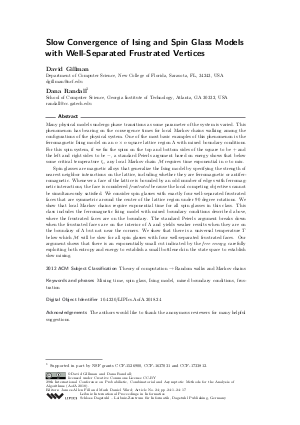Slow Convergence of Ising and Spin Glass Models with Well-Separated Frustrated Vertices
Authors David Gillman, Dana Randall
-
Part of:
Volume:
29th International Conference on Probabilistic, Combinatorial and Asymptotic Methods for the Analysis of Algorithms (AofA 2018)
Part of: Series: Leibniz International Proceedings in Informatics (LIPIcs)
Part of: Conference: International Conference on Probabilistic, Combinatorial and Asymptotic Methods for the Analysis of Algorithms (AofA) - License:
 Creative Commons Attribution 3.0 Unported license
Creative Commons Attribution 3.0 Unported license
- Publication Date: 2018-06-18
File

PDF
LIPIcs.AofA.2018.24.pdf
- Filesize: 0.51 MB
- 17 pages
Document Identifiers
Subject Classification
ACM Subject Classification
- Theory of computation → Random walks and Markov chains
Keywords
- Mixing time
- spin glass
- Ising model
- mixed boundary conditions
- frustration
Metrics
- Access Statistics
-
Total Accesses (updated on a weekly basis)
0Document
0Metadata
Abstract
Many physical models undergo phase transitions as some parameter of the system is varied. This phenomenon has bearing on the convergence times for local Markov chains walking among the configurations of the physical system. One of the most basic examples of this phenomenon is the ferromagnetic Ising model on an n x n square lattice region Lambda with mixed boundary conditions. For this spin system, if we fix the spins on the top and bottom sides of the square to be + and the left and right sides to be -, a standard Peierls argument based on energy shows that below some critical temperature t_c, any local Markov chain M requires time exponential in n to mix. Spin glasses are magnetic alloys that generalize the Ising model by specifying the strength of nearest neighbor interactions on the lattice, including whether they are ferromagnetic or antiferromagnetic. Whenever a face of the lattice is bounded by an odd number of edges with ferromagnetic interactions, the face is considered frustrated because the local competing objectives cannot be simultaneously satisfied. We consider spin glasses with exactly four well-separated frustrated faces that are symmetric around the center of the lattice region under 90 degree rotations. We show that local Markov chains require exponential time for all spin glasses in this class. This class includes the ferromagnetic Ising model with mixed boundary conditions described above, where the frustrated faces are on the boundary. The standard Peierls argument breaks down when the frustrated faces are on the interior of Lambda and yields weaker results when they are on the boundary of Lambda but not near the corners. We show that there is a universal temperature T below which M will be slow for all spin glasses with four well-separated frustrated faces. Our argument shows that there is an exponentially small cut indicated by the free energy, carefully exploiting both entropy and energy to establish a small bottleneck in the state space to establish slow mixing.
Cite As Get BibTex
David Gillman and Dana Randall. Slow Convergence of Ising and Spin Glass Models with Well-Separated Frustrated Vertices. In 29th International Conference on Probabilistic, Combinatorial and Asymptotic Methods for the Analysis of Algorithms (AofA 2018). Leibniz International Proceedings in Informatics (LIPIcs), Volume 110, pp. 24:1-24:17, Schloss Dagstuhl – Leibniz-Zentrum für Informatik (2018)
https://doi.org/10.4230/LIPIcs.AofA.2018.24
BibTex
@InProceedings{gillman_et_al:LIPIcs.AofA.2018.24,
author = {Gillman, David and Randall, Dana},
title = {{Slow Convergence of Ising and Spin Glass Models with Well-Separated Frustrated Vertices}},
booktitle = {29th International Conference on Probabilistic, Combinatorial and Asymptotic Methods for the Analysis of Algorithms (AofA 2018)},
pages = {24:1--24:17},
series = {Leibniz International Proceedings in Informatics (LIPIcs)},
ISBN = {978-3-95977-078-1},
ISSN = {1868-8969},
year = {2018},
volume = {110},
editor = {Fill, James Allen and Ward, Mark Daniel},
publisher = {Schloss Dagstuhl -- Leibniz-Zentrum f{\"u}r Informatik},
address = {Dagstuhl, Germany},
URL = {https://drops.dagstuhl.de/entities/document/10.4230/LIPIcs.AofA.2018.24},
URN = {urn:nbn:de:0030-drops-89170},
doi = {10.4230/LIPIcs.AofA.2018.24},
annote = {Keywords: Mixing time, spin glass, Ising model, mixed boundary conditions, frustration}
}
Author Details
Funding
- Randall, Dana: Supported in part by NSF grants CCF-1526900, CCF-1637031 and CCF-1733812.
